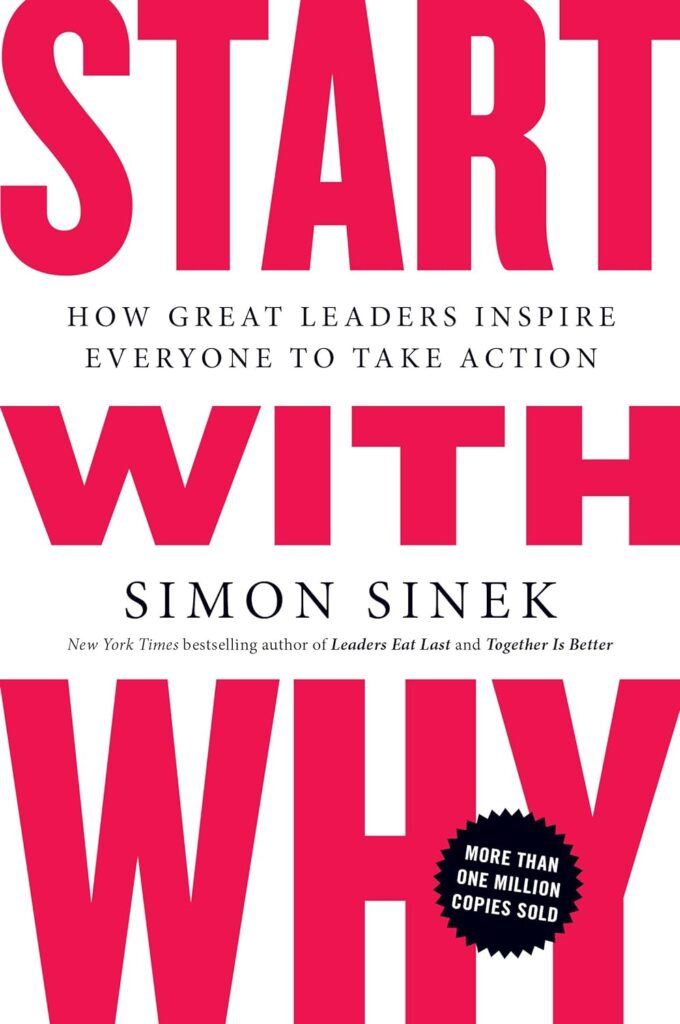Start With Why challenges us to identify the underlying purpose of why our businesses exist and use it to motivate employees and customers alike. Simon convincingly argues that a customer becomes loyal to a company when they merge part of their lifestyle or identity with why a company does business. While single transactions are often driven by price or new features, loyalty blooms when strong feelings (trust, confidence, excitement, etc.) exists between the customer and brand. This book has helped me better connect the company’s purpose to new product ideas and the customer’s feelings through a clearly articulated strategy.
You should read this book if you…
- seek to better understand or articulate your company’s purpose
- want to understand how to build customer loyalty
- want to learn how to amplify your values through how you go to market
Additional Information
Year Published: 2009
Book Ranking (from 1-10): 9 – Excellent – Broad and very well articulated insights
Ease of Read (from 1-5): 2 – Quick read
Key Highlights
- The ability to motivate is not difficult, but great leaders inspire people to act
- Repeat business is when people do business with you multiple times. Loyal customers often don’t even bother to research the competition, but it’s very hard to win loyalty
- Every company knows what they do, some know how they do it, but few companies can clearly articulate why they do what they do – their purpose cause or belief. Why do you get out of bed in the morning and why should anyone care?
- People don’t buy what you do, they buy why you do it. Apple’s why – to challenge the status quo
- We buy products from companies we’re loyal to so we can validate our lifestyle. Those products become proof of why people do what they do. They become symbols of the values and beliefs we hold dear
- We need to articulate our values as verbs, not nouns. Verbs give us a clear idea of how to act in any situation
- You can’t ask others what you have to do to be authentic. Being authentic means you already know
- When a salesman believes in what they are selling, their words are authentic, which exudes passion and produces trusting relationships which is where loyalty comes from
- Trust is a feeling, not a rational experience. We trust some people and companies even when things go wrong. Trust begins to emerge when we have a sense that another person or organization is driven by things other than their own self- gain
- “You don’t hire for skills, you hire for attitude. You can always teach skills.” This is all fine and good; the problem is, which attitude? What if their attitude is not one that fits your culture?
- The role of a leader is not to come up with all the great ideas. The role of a leader is to create an environment in which great ideas can happen. It is the people inside the company, those on the front lines, who are best qualified to find new ways of doing things
- Great organizations become great because the people inside the organization feel protected. The strong sense of culture creates a sense of belonging and acts like a net. People come to work knowing that their bosses, colleagues and the organization as a whole will look out for them. This results in reciprocal behavior. Individual decisions, efforts and behaviors that support, benefit and protect the long- term interest of the organization as a whole
- The early majority, indeed the entire majority, need the recommendation of someone else who has already sampled the product or service. They need to know someone else has tested it. They need that trusted, personal recommendation
- You don’t just want any influencer, you want someone who believes what you believe. Only then will they talk about you without any prompts or incentives. If they truly believe in what you believe and if they are truly on the left side of the curve they won’t need to be incentivized; they’ll do it because they want to
- Achievement is something you reach or attain, like a goal. It is something tangible, clearly defined and measurable. Success, in contrast, is a feeling or a state of being
- Achievement comes when you pursue and attain WHAT you want. Success comes when you are clear in pursuit of WHY you want it. The former is motivated by tangible factors while the latter by something deeper in the brain, where we lack the capacity to put those feelings into words. Success comes when we wake up every day in that never- ending pursuit of WHY we do WHAT we do
- Value is a feeling, not a calculation. It is perception
- Great second or third CEOs don’t take the helm to implement their own vision of the future; they pick up the original banner and lead the company into the next generation. That’s why we call it succession, not replacement. There is a continuity of vision
- Before it can gain any power or achieve any impact, an arrow must be pulled backward, 180 degrees away from the target. And that’s also where a WHY derives its power. The WHY does not come from looking ahead at what you want to achieve and figuring out an appropriate strategy to get there. It is not born out of any market research. It does not come from extensive interviews with customers or even employees. It comes from looking in the completely opposite direction from where you are now. Finding WHY is a process of discovery, not invention

Discover more from The Broader Application
Subscribe to get the latest posts sent to your email.
